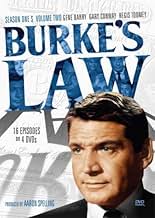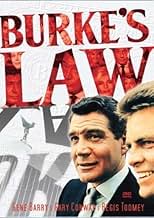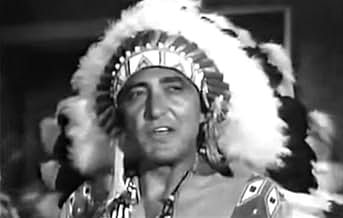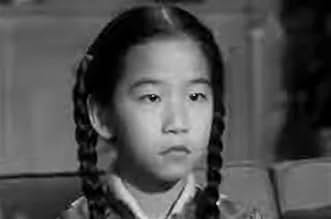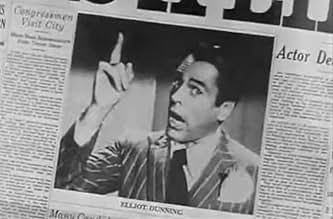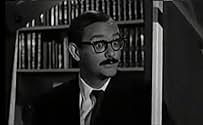CALIFICACIÓN DE IMDb
7.3/10
1.1 k
TU CALIFICACIÓN
Un capitán millonario de la división de homicidios de la policía de Los Ángeles es conducido a la escena del crimen en su Rolls-Royce de 1962 por su leal chofer.Un capitán millonario de la división de homicidios de la policía de Los Ángeles es conducido a la escena del crimen en su Rolls-Royce de 1962 por su leal chofer.Un capitán millonario de la división de homicidios de la policía de Los Ángeles es conducido a la escena del crimen en su Rolls-Royce de 1962 por su leal chofer.
- Premios
- 1 premio ganado y 2 nominaciones en total
Explorar episodios
Opiniones destacadas
The earliest shows I remember watching were kiddie shows or things my parents liked. I was about age 10 when "Burke's Law" came on and it was the first show I decided I really liked after I began to form my own tastes. It was a light but sophisticated murder mystery show that was more comedy than drama. It was the first of the "all-star" cast whodunits and lead to the later "Murder She Wrote", "Matlock" and "Diagnosis Murder", which were created by some of the people responsible for "Burke's Law". Levinson and Link, the creators of "Columbo", also wrote may of the scripts for "Burke's Law". The show was Aaron Spelling's first big hit, so it has quite a pedigree.
What really made it interesting was the eccentric characters who made up the suspects. They were played by an eclectic group of character actors taken from the usual TV "repertory" group, the stars of other shows, former and even current movie stars, silent movie stars and even people from the independent film movement and the British theater and films, who were happy at the American TV exposure and quick paycheck they got for performing a few scenes on the show. You can see oddities like Basil Rathbone listening in pain to John Cassavetes doing a "beatnik Hamlet", Sterling Holloway trying to blackmail Cassavetes, William Demarest running a hotel for ex-Vaudvillians where an acrobatic act earns their keep by cleaning the chandeliers, a convention of police chiefs, each one modeled on a famous fictional detective, (it anticipates Neil Simon's "Murder by Death"), a fake Russian aristocrat who really isn't fake but figures that no one will believe him anyway so he pretends to be a fake, etc, etc.
Gene Barry, one of several Cary Grant imitators on TV at the time, (see Craig Stevens in "Peter Gunn", John Vivien in "Mr Lucky"), is perfect for the lead role, better than Dick Powell in the pilot, which was made two years before as part of Powell's anthology series. Powell would have played the lead in the show but died of cancer before he could undertake the role. They say acting is reacting and Barry is the greatest reactor in TV history, the perfect guy to play off of all the eccentrics. Gary Conway, who should have become a much bigger star, (he was later in "Land of the Giants"), Regis Toomey, the gorgeous Eileen O'Neill and Leon Lontoc offered excellent support.
Unfortunately, somebody, (Spelling? The network?), decided to junk the show by turning it into an under-financed, back-projected spy show. Burke suddenly abandoned LA and is mansion and Rolls-Royce to become a James Bond style agent who traveled the world for a secret government organization headed by someone called "The Man". It was a tepid version of "The Man From Uncle" and was placed opposite what turned out to be the greatest of all spy shows," I Spy", which was in color and filmed in actual locations around the world. The local ABC affiliate in Syracuse declined to even show "Amos Burke Secret Agent" and from what I saw of the episode in syndication, I can't blame them.
Amazingly, the program had a third incarnation and the by now fabulously successful Aaron Spelling brought it back in 1994. Burke was back in LA chasing crooks in his Rolls, but with a son to help him. they dusted off the old scripts for the new shows. Only occasionally did we see the old spark of creativity, such as a victim freezing to death on the hottest day of the year, an ambulance chasing lawyer getting run over by an ambulance, Ephraim Zimbalist Jr. as a greedy tycoon practicing his golf drive from the rook of his building, (who cares who it falls on?), and Brian Keith as an ex-marine turned romance novelist who puts on a dress to get in the mood to write. Still is was a lot better than the other new murder mystery which followed it, "Diagnosis Murder" with Dick Van Dyke. Unfortunately, the network kept the wrong one, (I doubt they cried about it, as it went on for years).
Without the original "Burke's Law", there would have been no "Diagnosis Murder". The original remains the best whodunit in TV history and one of the most entertaining shows of all time.
What really made it interesting was the eccentric characters who made up the suspects. They were played by an eclectic group of character actors taken from the usual TV "repertory" group, the stars of other shows, former and even current movie stars, silent movie stars and even people from the independent film movement and the British theater and films, who were happy at the American TV exposure and quick paycheck they got for performing a few scenes on the show. You can see oddities like Basil Rathbone listening in pain to John Cassavetes doing a "beatnik Hamlet", Sterling Holloway trying to blackmail Cassavetes, William Demarest running a hotel for ex-Vaudvillians where an acrobatic act earns their keep by cleaning the chandeliers, a convention of police chiefs, each one modeled on a famous fictional detective, (it anticipates Neil Simon's "Murder by Death"), a fake Russian aristocrat who really isn't fake but figures that no one will believe him anyway so he pretends to be a fake, etc, etc.
Gene Barry, one of several Cary Grant imitators on TV at the time, (see Craig Stevens in "Peter Gunn", John Vivien in "Mr Lucky"), is perfect for the lead role, better than Dick Powell in the pilot, which was made two years before as part of Powell's anthology series. Powell would have played the lead in the show but died of cancer before he could undertake the role. They say acting is reacting and Barry is the greatest reactor in TV history, the perfect guy to play off of all the eccentrics. Gary Conway, who should have become a much bigger star, (he was later in "Land of the Giants"), Regis Toomey, the gorgeous Eileen O'Neill and Leon Lontoc offered excellent support.
Unfortunately, somebody, (Spelling? The network?), decided to junk the show by turning it into an under-financed, back-projected spy show. Burke suddenly abandoned LA and is mansion and Rolls-Royce to become a James Bond style agent who traveled the world for a secret government organization headed by someone called "The Man". It was a tepid version of "The Man From Uncle" and was placed opposite what turned out to be the greatest of all spy shows," I Spy", which was in color and filmed in actual locations around the world. The local ABC affiliate in Syracuse declined to even show "Amos Burke Secret Agent" and from what I saw of the episode in syndication, I can't blame them.
Amazingly, the program had a third incarnation and the by now fabulously successful Aaron Spelling brought it back in 1994. Burke was back in LA chasing crooks in his Rolls, but with a son to help him. they dusted off the old scripts for the new shows. Only occasionally did we see the old spark of creativity, such as a victim freezing to death on the hottest day of the year, an ambulance chasing lawyer getting run over by an ambulance, Ephraim Zimbalist Jr. as a greedy tycoon practicing his golf drive from the rook of his building, (who cares who it falls on?), and Brian Keith as an ex-marine turned romance novelist who puts on a dress to get in the mood to write. Still is was a lot better than the other new murder mystery which followed it, "Diagnosis Murder" with Dick Van Dyke. Unfortunately, the network kept the wrong one, (I doubt they cried about it, as it went on for years).
Without the original "Burke's Law", there would have been no "Diagnosis Murder". The original remains the best whodunit in TV history and one of the most entertaining shows of all time.
I never heard of this until 9 years ago and saw an episode posted on the Internet Archive and it was described as being the episode bumped to the following week because it was to air the night of the Kennedy assassination. It was interesting enough but I forgot the show and didnt think much of it until I started seeing old movies and Gene Berry started turning up in alot of them in varying roles, The Houston Story (sympathetic bad guy), Naked Alibi (sociopath) and the most memorable for me was the overlooked Samuel Fuller movie, China Gate where he plays an antihero mercenary (also Nat King Cole acted great and its the best thing I ever saw Angie Dickinson do).
This show has a really great first two seasons. Amos Burke is a suave and wealthy LA homicide detective. Someone with a sharp eye and quick wit. A welcome change from some of the villains Berry has played in those Noir movies. The stories are interesting with good twists and all had titles begining with "Who killed...."
I loved the format but I guess the ratings were luke warm hence the complete change in storyline to capitalize on the mid 60s secret agent craze. Those episodes lost the charm the first two seasons had. Instead it was lightweight Americanized made for TV James Bond type entertainment. Maybe the writing was still good but the format isn't to my liking. Thpse shows were too common and they were like westerns in the 1950s. On everywhere.
With the benefit of not having nostalgia for this show, I can see it in a modern way and I notice these types of cop shows were fairly unique then and still so now. If they thought to set Burkes Law in Hawaii, there may never have been a Steve McGarratt or Hawaii Five-O or Amos Burke-Secret Agent.
This show has a really great first two seasons. Amos Burke is a suave and wealthy LA homicide detective. Someone with a sharp eye and quick wit. A welcome change from some of the villains Berry has played in those Noir movies. The stories are interesting with good twists and all had titles begining with "Who killed...."
I loved the format but I guess the ratings were luke warm hence the complete change in storyline to capitalize on the mid 60s secret agent craze. Those episodes lost the charm the first two seasons had. Instead it was lightweight Americanized made for TV James Bond type entertainment. Maybe the writing was still good but the format isn't to my liking. Thpse shows were too common and they were like westerns in the 1950s. On everywhere.
With the benefit of not having nostalgia for this show, I can see it in a modern way and I notice these types of cop shows were fairly unique then and still so now. If they thought to set Burkes Law in Hawaii, there may never have been a Steve McGarratt or Hawaii Five-O or Amos Burke-Secret Agent.
TV actors, at least in the old days when they were placed in a separate class from movie actors, often seemed to be clones of their movie brethren. Some were singular in their associations. Nehemiah Persoff seemed to be the Edward G. Robinson of television, getting similar roles and acting them in a very similar manner. Carolyn Jones was the Bette Davis of TV, even to the point of playing a set of sisters one of whom is a murderer on Burke's Law. Other's had company in their pursuits. The western stars were all either John Wayne or Gary Cooper, with an occasional Jimmy Stewart or Henry Fonda thrown in, (including the real thing on "The Deputy"). There were a whole selection of Clark Gables, including John Russell, Rory Calhoun, Richard Egan , Robert Lowery and others. There were plenty of Brandos, including Burt Reynolds, George Maharis and John Saxon. There were enough Rock Hudsons to fill a theater, with John Gavin, Tom Tryon and Gardner McKay coming immediately to mind. The blonde versions I call the "Redfords", a group of thoughtful , well educated types of which Robert Redford was one along with James Franciscus, Richard Chamberlain and William Shatner. They had varying degrees of success with Redford emerging as the head of the class.
Perhaps the most successful strain, however were the Cary Grants. Grant made an ideal model for the suave detective hero, able to be charming or tough as the occasion demanded. Craig Stevens was hired to play Peter Gunn specifically because of a strong resemblance to Grant. His tightlipped performance was not really very charming but it's surely how Cary would have played that character. Latern-jawed John Vivyan played a role that Grant had actually essayed in the movies, Mr. Lucky. He was competent at best. The heroes of the Warner Brother's detective shows were largely based on Cary Grant. Ephram Zimbelist Jr.'s Stu Bailey was a grant-style role with a lot more charm than Peter Gunn. Richard Long's Rex Randolph on Bourbon Street Beat was much the same. Anthony Eisley's Tracy Steele was a less convincing version of the same character on Hawaiian Eye.
But the best of the Grant clones was Gene Barry. He was male-model handsome, had good breeding and seductive whiskey voice. He was also TV's greatest reactors. He had a series of comic takes that was perfect for Amos Burke, who had to confront an unending series of eccentric subjects. Yet he could turn around and romance the ladies or get tough with the tough guys. And he was a good enough actor to hold up his end when the heavy dramatics intervened.
One wonders what the originals of these clones must have thought as they watched the boob tube in it's infancy.
Perhaps the most successful strain, however were the Cary Grants. Grant made an ideal model for the suave detective hero, able to be charming or tough as the occasion demanded. Craig Stevens was hired to play Peter Gunn specifically because of a strong resemblance to Grant. His tightlipped performance was not really very charming but it's surely how Cary would have played that character. Latern-jawed John Vivyan played a role that Grant had actually essayed in the movies, Mr. Lucky. He was competent at best. The heroes of the Warner Brother's detective shows were largely based on Cary Grant. Ephram Zimbelist Jr.'s Stu Bailey was a grant-style role with a lot more charm than Peter Gunn. Richard Long's Rex Randolph on Bourbon Street Beat was much the same. Anthony Eisley's Tracy Steele was a less convincing version of the same character on Hawaiian Eye.
But the best of the Grant clones was Gene Barry. He was male-model handsome, had good breeding and seductive whiskey voice. He was also TV's greatest reactors. He had a series of comic takes that was perfect for Amos Burke, who had to confront an unending series of eccentric subjects. Yet he could turn around and romance the ladies or get tough with the tough guys. And he was a good enough actor to hold up his end when the heavy dramatics intervened.
One wonders what the originals of these clones must have thought as they watched the boob tube in it's infancy.
I was born in the 1960s and had never heard of this gem until I found it online recently. And I have to say that I'm very pleasantly surprised. It's about a Millionaire homicide Chief (inheritance from his father). Each episode takes us through a new killing where the Chief and his trusty chauffer and sidekicks solve a murder. There are so many of the old TV stars here. I've seen Sammy Davis Jr., Zsa Zsa Gabor, William Shatner, Annette Funicello, James MacArthur, and many others that I can't quite recall their names. It's a great watch for anyone who appreciated these classic series.
I actually laugh out loud watching this tongue-in-cheek cop show. It never took itself seriously and the guest stars loved hamming it up. A long list of Silver Age screen stars and future T.V. stars kept things moving at a brisk pace. Many you'll recognize just before they became TV', most famous stars. William Shatner, Elizabeth Montgomery, and many others. It even took pot-shots at it's own formula. For example in one episode the culprit makes a dash for the stairs to escape and is admonished by Amos Burke as 'Not that old cliché" or lines like "You've been watching too many cop shows on TV." A revival was attempted in 1984 but didn't hit all the right notes. Sexist by today's standards in the way Burke treated his lady friends, but it was a product of it's time. But of course if Burke ever became serious that would take away from his duties which Burke took very seriously. They couldn't make the show today without taking away it's dated charm. Don't forget Captain Amos Burke (Gene Barry) could SING too.
¿Sabías que…?
- TriviaFor the show's final season in 1965 - 66, the format was completely changed in order to capitalize on the popularity of spy shows like "El agente secreto de C.I.P.O.L. (1964)," with Amos Burke himself becaming a secret agent. The title of the series was changed accordingly: "Amos Burke - Secret Agent." But the new format proved unpopular, and the show was cancelled.
- Créditos curiososIn the opening credits, the title of the show was always announced by the voice of a woman saying, VERY seductively, "Burke's Law".
- Versiones alternativasSome "Amos Burke, Secret Agent" syndication prints retain that title sequence, but with the title changed to "Burke's Law" and a male announcer speaking the title (as with the original "Amos Burke, Secret Agent" episodes).
- ConexionesFollowed by Burke's Law (1994)
Selecciones populares
Inicia sesión para calificar y agrega a la lista de videos para obtener recomendaciones personalizadas
- How many seasons does Burke's Law have?Con tecnología de Alexa
Detalles
- Fecha de lanzamiento
- País de origen
- Idioma
- También se conoce como
- Burke's Law
- Locaciones de filmación
- Productoras
- Ver más créditos de la compañía en IMDbPro
- Tiempo de ejecución50 minutos
- Color
- Relación de aspecto
- 1.33 : 1
Contribuir a esta página
Sugiere una edición o agrega el contenido que falta

Principales brechas de datos
What is the French language plot outline for El detective millonario (1963)?
Responda



